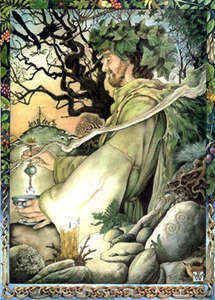Post by Senbecc on Nov 15, 2006 9:30:34 GMT -5
In spite of the political turbulence and chaos of the fourth century BC, Greece was poised on its most triumphant period: the Hellenistic age. The word, Hellenistic, is derived from the word, Hellene, which was the Greek word for the Greeks. The Hellenistic age was the "age of the Greeks; during this time, Greek culture and power extended itself across the known world. While the classical age of Greece produced great literature, poetry, philosophy, drama, and art, the Hellenistic age "hellenized" the world. At the root of Hellenism were the conquests of Philip of Macedon and his son, Alexander. However, the Macedonians did more than control territory; they actively exported Greek culture: politics, law, literature, philosophy, religion, and art. This was a new idea, exporting culture, and more than anything else this exporting of culture would deeply influence all the civilizations and cultures that would later erupt from this soil: the Romans, the Christians, the Jewish diaspora, and Islam.
Macedon
Macedon all during the age of the Greek city-states was an anomaly: it was a Greek kingdom. Located north-east of the Greek mainland and northwest of Asia Minor, Macedon was firmly entrenched on the European continent. The Macedonians were the Greeks who had to contend, then, with all the European tribes, many of which were war-like. So the Macedonians served as a kind of buffer for the Greeks, as the faithful Greeks who stood between the tribal Europeans and the Greek city-states. For all that, the Macedonians were deeply unappreciated by their fellow Greeks; they were looked on as no better than barbarians themselves, particularly since they had never developed or adopted the polis.
The Macedonians were ruled by a king, much like the Mycenean kings. The king came to power through inheritance, but first had to be approved by the army. Beneath the king was an aristocracy of nobles who had a limited amount of power; like all monarchies that shared power with an aristocracy, the balance of power frequently shifted from the king to the nobles and back again. Into this situation, at the peak of the political chaos roiling the Greek world to the south, stepped a powerful king who unified the country of Macedon and set his sights on conquering the whole of the Greek world.
www.wsu.edu/~dee/GREECE/HELLGREE.HTM
Macedon
Macedon all during the age of the Greek city-states was an anomaly: it was a Greek kingdom. Located north-east of the Greek mainland and northwest of Asia Minor, Macedon was firmly entrenched on the European continent. The Macedonians were the Greeks who had to contend, then, with all the European tribes, many of which were war-like. So the Macedonians served as a kind of buffer for the Greeks, as the faithful Greeks who stood between the tribal Europeans and the Greek city-states. For all that, the Macedonians were deeply unappreciated by their fellow Greeks; they were looked on as no better than barbarians themselves, particularly since they had never developed or adopted the polis.
The Macedonians were ruled by a king, much like the Mycenean kings. The king came to power through inheritance, but first had to be approved by the army. Beneath the king was an aristocracy of nobles who had a limited amount of power; like all monarchies that shared power with an aristocracy, the balance of power frequently shifted from the king to the nobles and back again. Into this situation, at the peak of the political chaos roiling the Greek world to the south, stepped a powerful king who unified the country of Macedon and set his sights on conquering the whole of the Greek world.
www.wsu.edu/~dee/GREECE/HELLGREE.HTM



